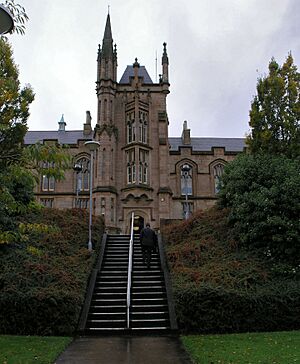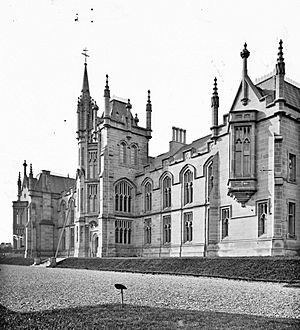Magee College facts for kids

The Magee main building
|
|
|
Former names
|
University of Ulster at Magee, New University of Ulster at Magee Magee University College Magee College |
|---|---|
| Type | Public research university |
| Established | 1865 – Magee College 1953 – Magee University College 1968 – Coleraine Campus established; New University of Ulster established 1969 – Magee College merge 1982 – Ulster Polytechnic merge; University of Ulster established 2014 – Ulster University rebrand |
| Endowment | £6.483 million (2014) |
| Budget | £185m |
| Chancellor | Colin Davidson |
| Vice-Chancellor | Professor Paul Bartholomew |
| Students | 5,098 (2014/15) |
| Location |
,
55°00′22″N 7°19′23″W / 55.006°N 7.323°W |
| Colours | Logo:Navy blue & Bronze Seal:Red & Gold Formerly:Navy blue, Blue & Green |
| Affiliations | Ulster University |
 |
|
The Ulster University Derry~Londonderry campus, often called Magee College, is one of the four main locations of Ulster University. It is found in Derry, Northern Ireland. The college first opened its doors in 1865. Back then, it was a Christian college focused on arts and theology.
Since 1953, Magee College has been open to everyone, no matter their religious background. Today, it offers many different courses for students. You can study subjects like business, law, social work, and creative arts. There are also programs in computer science, computer games, psychology, and nursing.
Contents
Studying at Magee Campus
Magee Campus offers many courses for students who are just starting their university journey (undergraduate) and those who want to study more deeply (postgraduate). These courses are part of Ulster University's four main faculties:
- Arts, Humanities and Social Sciences
- Computing, Engineering and the Built Environment
- Life and Health Sciences
- Ulster Business School
Each faculty has different schools that teach specific subjects. The schools located at the Derry~Londonderry campus include:
- Arts, Humanities and Social Sciences: School of Arts and Humanities, School of Education, School of Law, School of Applied Social and Policy Studies
- Computing, Engineering & the Built Environment: School of Computing, Engineering and Intelligent Systems
- Life and Health Sciences: School of Nursing and Paramedic Science, School of Psychology, School of Health Sciences, School of Medicine
- Ulster Business School: Department of Global Business and Enterprise
Students at Magee can learn about many exciting topics. These include drama, law, education, and cinematic arts. You can also study computer science, robotics, electronics, music, and nursing. Other subjects are history, politics, and sociology.
Research at Magee
Magee Campus is also a place where important research happens. There are several research groups and centers here.
The campus is a key spot for research in the Faculty of Arts, Humanities, and Social Sciences. This includes studies in Irish history, social work, and creative arts.
It is also home to the Intelligent Systems Research Centre (ISRC). This center works on creating smart computer systems. They research things like artificial intelligence and how robots can think. Other research areas include smart environments and robot vision.
The university also hosts International Conflict Research (INCORE). This is a joint project with the United Nations University. It started in 1993 to help solve problems in Northern Ireland. It also works to promote peace around the world.
Campus Leaders
The main academic leader at the campus is called the Provost. Several people have held this important role over the years. Professor Cathy Gormley Heenan became the Provost for the entire Ulster University in 2023.
History of Magee College
The campus is named after Martha Magee. She was the wife of a Presbyterian minister. In 1845, she left £20,000 in her will to start a college. This college would teach theology and arts.
Magee College first opened in 1865. It was mainly a college for religious studies. However, it welcomed students from all backgrounds to study various subjects.
For a time, it was connected to the Royal University of Ireland. Later, it became linked with Trinity College, Dublin.
Magee During World War II
During the Second World War, the British Navy took over the college. It became a major base for fighting in the Battle of the Atlantic. A secret control bunker was built under the college lawns. From 1941, this bunker helped control Allied forces. It was used to fight against German submarines.
In 2013, Magee hosted a competition in Artificial Intelligence. This event was based on the famous Turing Test.
After the War
In 1953, the religious part of Magee College became separate. It later moved to Belfast.
Also in 1953, Magee College became Magee University College. Many people hoped it would become Northern Ireland's second university. However, a new university was built in Coleraine instead. Magee then joined the New University of Ulster in 1969. For the next 14 years, the college became smaller.
In 1984, the New University joined with another college. This created the University of Ulster, which had four campuses. Magee then became a key focus for growth. Student numbers grew quickly over the next 10 to 15 years. Many new buildings were also constructed.
Magee grew from just 273 students in 1984 to over 4,000 in 2012. In October 2014, the University of Ulster changed its name to Ulster University. In 2021, a new medical school opened at Magee. The campus was rebranded as Ulster University Derry~Londonderry Campus in 2023.
Important Dates
- 1845: Martha Magee left money to start the college.
- 1865: Magee College opened.
- 1953: Magee University College received major government funding.
- 1969: Magee University College joined the New University of Ulster.
- 1984: The New University merged to form the University of Ulster.
- 2014: The university was rebranded as Ulster University.
- 2021: Graduate Entry Medical School (GEMS) opened.
- 2023: Rebranded to Ulster University Derry~Londonderry Campus.
Interesting Facts
- Florence Nightingale, a famous nurse, visited Magee College on May 31, 1867.
- Martha Magee's gift to the college is mentioned on her memorial in Lurgan.
Campus Buildings
The main part of the campus is the original building from 1865. It is surrounded by older Victorian houses. There are also many modern buildings made of red brick and glass. These were built after Ulster University was formed.
The campus is used for teaching and learning. It also hosts events and conferences. For example, Magee hosted the Tomo-Dachi convention in 2006.
Recent Building Projects
- 1988: Phase I building completed.
- 1989: Carrickmore House and an extension to the main building were added.
- 1990: A new library building was finished.
- 1995: Phase III buildings, including a sports complex, were built. New student housing and a sports ground were also added.
- 2018: A new Teaching Block opened next to the library.
- Plans were announced in 2023 for a new teaching block to start construction in 2026.
Tip O'Neill Chair
The Tip O'Neill Chair in Peace Studies is based at Magee. It was created to honor Thomas "Tip" O'Neill Jr. He was a US politician who supported peace in Northern Ireland. Former US President Bill Clinton officially started the chair in 1995.
The Nobel Peace Prize winner, John Hume, held this chair from 2002 to 2009. During his time, many important leaders gave talks at Magee. These included:
- Mitchell Reiss, US Special Envoy to Northern Ireland (2006)
- John Kerry, US Senator (2006)
- Hillary Clinton, US Senator (2004)
- Kofi Annan, UN Secretary-General (2004)
- Bill Clinton, former US President (2003)
Professor Brandon Hamber currently holds the Tip O'Neill Chair.
Famous People from Magee
Many notable people have studied or received honors from Magee.
Alumni (Former Students)
- Gregory Campbell, politician (1982)
- Mark Durkan, former Deputy First Minister of Northern Ireland (around 1980s)
- Brooke Scullion, Irish singer who represented Ireland in the 2022 Eurovision Song Contest (2020)
Honorary Graduates
These are people who have received special degrees from Magee to honor their achievements.
- Paddy Ashdown, former political leader (2006)
- Amanda Burton, actor (2002)
- Bill Clinton, former President of the United States (1995)
- Hillary Clinton, US Senator (2004)
- Enya, Irish singer (2007)
- Gary Lightbody, Musician (2012)
- Stephen Rea, actor (2004)
- Fiona Shaw, actor (2004)
- Sir Ian McKellen, actor (2013)
Images for kids





